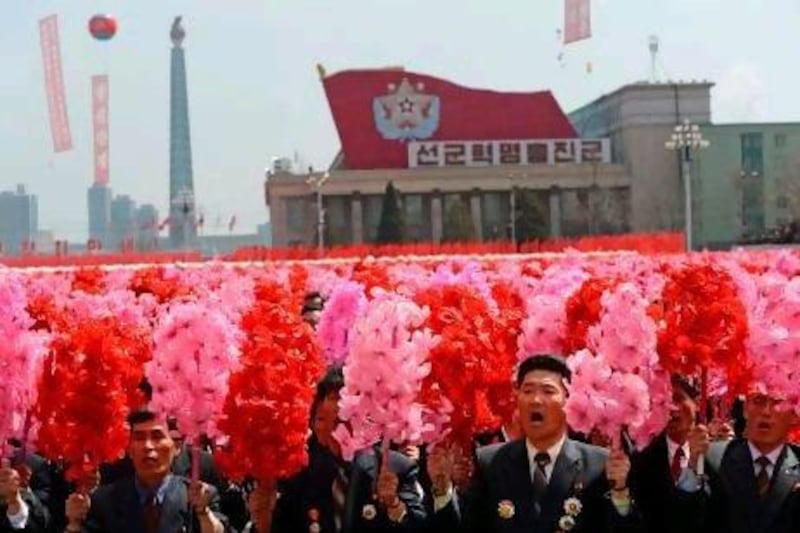BEIJING // With thousands of goose-stepping soldiers and missiles by the dozen parading before him, a baby-faced leader grinned as he surveyed the armed forces during yesterday's military extravaganza in North Korea.
Held to mark 100 years since the birth of the country's founder, Kim Il-sung, the celebration's chief significance was a defiant speech by the new leader, Kim Jong-un, who insisted his country must persist with its "military first" policy to achieve "final victory".
Kim Jong-un's inaugural words in public, a contrast to his late father Kim Jong-il's practice of not speaking at such events, came two days after a rocket launch by the country ended ignominiously with an explosion within two minutes of take-off.
Speaking to tens of thousands in Kim Il-sung Square in Pyongyang, Kim Jong-un said North Korea must place military might "first, second and third" in its priorities and strengthen its army "in every way we can".
"Superiority in military technology is no longer monopolised by imperialists," said the 20-something leader, a grandson of Kim Il-sung.
There was no mention of Friday's launch failure. The rocket officially was to take a satellite into space but it was widely seen as a test for ballistic missile technology that could carry nuclear warheads, although Mr Kim did say the time was "forever over" when other countries could threaten North Korea with nuclear weapons.
He ended with a rousing call for the nation to "go forward toward final victory".
Television pictures showed the fledgling leader, who took over after Kim Jong-il's death in December, watching the parade from a platform overlooking the square.
He was flanked by the long-serving 84-year-old parliamentary chief Kim Yong-nam as he chatted with a trio of military officials, sometimes gesticulating, grinning and saluting.
With a brass band playing, thousands of goose-stepping soldiers and sailors from the country's 1.2 million-strong military passed by.
The show of military might continued with tanks, missiles and other military hardware, while five aircraft flew overhead leaving a trail of coloured smoke.
Sohn Young-hwan, head of Seoul's Institute of Technology and Management Analysis, told the Associated Press he believed it could be a mid-range ballistic missile, while others suggested it could be a mock-up of an intercontinental ballistic missile.
Military officials watching events clapped in unison, while North Korean television cameras occasionally cut to what appeared to be a small number of foreigners waving as they took in the spectacle.
The assembled members of the crowd, in carefully choreographed displays, together created North Korean flags, hammer and sickle images and the numbers 4.15, representing Kim Il-sung's April 15 birthday, a national holiday.
Gazing upon it all were vast portraits of the "Great Leader" Kim Il-sung, who ruled from 1948 until his death in 1994, and the son who followed him, the "Dear Leader" Kim Jong-il, still in power when he died in December.
Since 2006, North Korea has conducted two underground nuclear tests and three failed rocket launches as part of what analysts believe is a nuclear weapons programme aimed at developing long-range missiles that could threaten countries including the United States.
Friday's launch prompted criticism from the UN Security Council and led the United States to cancel plans to provide 240,000 tonnes of food aid to North Korea, where many of the 23 million citizens are believed to suffer food shortages.
The deal, announced in late February, included safeguards to ensure food aid would not be diverted to soldiers, the "military first" policy having led to concerns over this in the past.
Apparent plans for a nuclear test have been revealed by satellite images, and suspicions are heightened now because such tests followed soon after rocket launches in 2006 and 2009.
Many analysts have suggested the failure of Friday's launch means the regime will be keen to press ahead with a nuclear test to restore national pride.
dbardsley@thenational.ae






